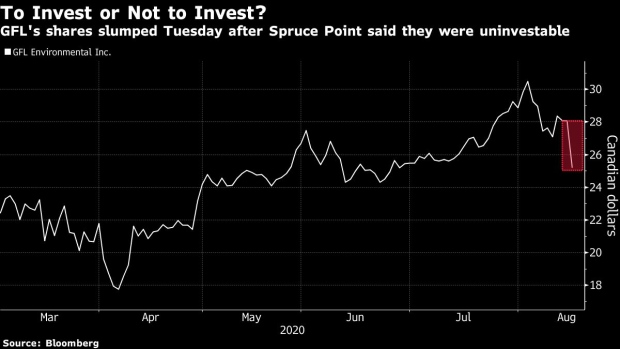Aug 18, 2020
Hedge Fund Spruce Point Calls Canada Waste Firm ‘Uninvestable’
, Bloomberg News

(Bloomberg) -- Shares of waste management company GFL Environmental Inc. fell as much as 12% after a New York hedge fund released a report questioning its accounting and its “aggressive and opaque business model.”
The 107-page report by Spruce Point Capital Management LLC says the company requires injections of new capital and claims Chief Executive Officer Patrick Dovigi has “questionable” business connections. The allegations have not been proven. Dovigi declined to comment by email, saying the company will respond in short order.
“Spruce Point believes that without access to new capital, the Company’s shares are worthless and likely uninvestable for institutional investors,” the report states. The report includes a disclaimer telling readers they should assume Spruce Point and affiliates have a short position in GFL.
GFL, based in Vaughan, Ontario, went public on March 3, just as a stock market selloff sparked by Covid-19 was gaining momentum. Two previous attempts at IPOs had failed; among investor concerns were the company’s large debt level and spending on acquisitions.
GFL shares fell were down nearly 8% as of 12:40 p.m. in New York, wiping out about $540 million in market value.
“Spruce Point’s ‘strong sell’ recommendation may trigger increased scrutiny of GFL Environmental, given the waste business’s high leverage and limited history as a public company,” Scott Levine, an analyst with Bloomberg Intelligence, wrote. “The report alleges improper management and aggressive accounting, and suggests regulators may fail to approve over $2 billion in acquisitions announced since June.”
GFL announced a deal Aug. 12 to buy WCA Waste Corp. for $1.2 billion in a move that would expand its waste collection operations across 11 U.S. states, including Texas, Missouri and Florida.
In its report, Spruce Point referenced the debt levels, which stood at C$5.29 billion ($4 billion) at the end of the second quarter. “Given that a meaningful portion of GFL’s stock is pledged as collateral for loans, we contend there is a real risk that the stock may collapse and the company’s auditor may not sign-off on its financials after reviewing the evidence included in our report.”
©2020 Bloomberg L.P.